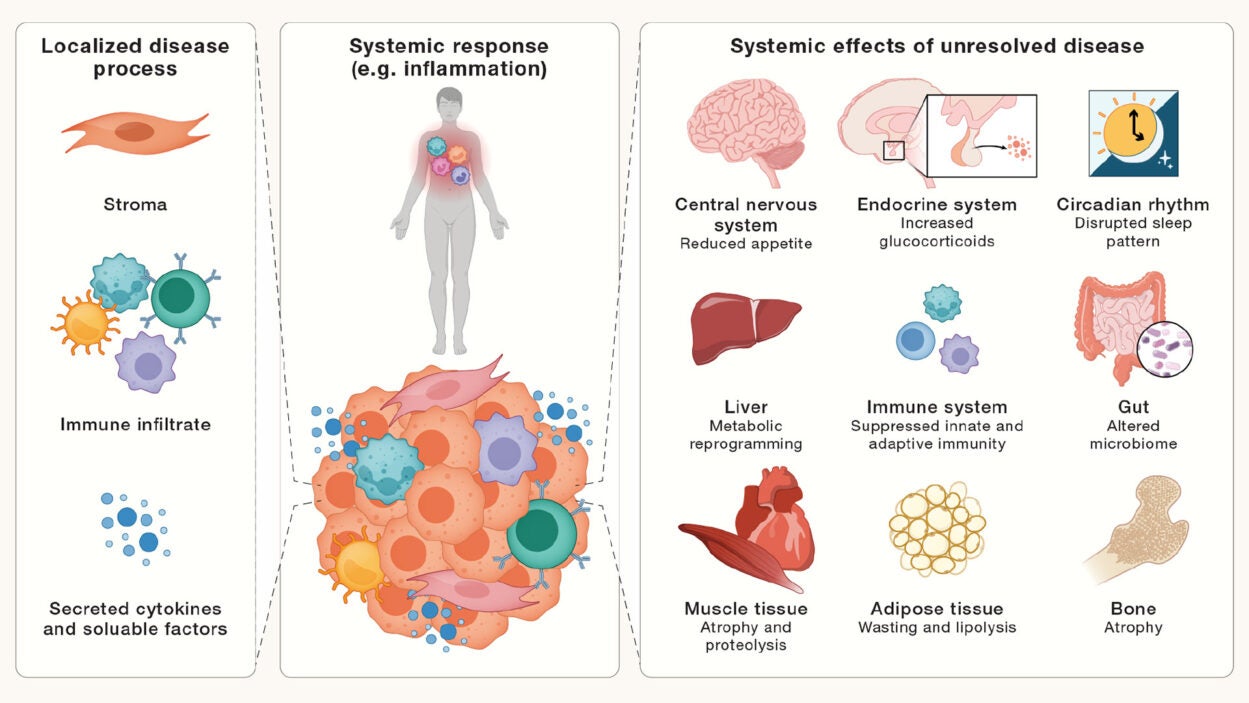About 10 million people die every year of cancer. It’s the second leading cause of death in the U.S., behind heart disease, with more than 1,500 fatalities here each day. Yet, much about it remains unknown.
Researchers have linked some behaviors to a higher risk of developing the disease. People who smoke, for example, tend to have higher rates of lung cancer. Those who spend lots of time outside without sunscreen may develop skin cancer.
Scientists have long known that nutrition and cancer are also connected. But diet may influence more than just our likelihood of developing the disease. It might also affect how patients respond to therapies and their health while undergoing treatment.
At the Cold Spring Harbor Laboratory (CSHL) Cancer Center, scientists work to better understand the links between cancer and nutrition. The hope is that their groundbreaking findings will one day lead to better patient outcomes.
What’s for dinner?
“The biggest challenge of our life is to figure out what should we eat,” says CSHL Assistant Professor and Cancer Center member Semir Beyaz. “Every disease that influences a majority of the human population—chronic diseases, non-communicable diseases, infections, cancer, heart disease, neurological disorders, depression—has some link to the ways we consume food.”
Beyaz’s lab studies nutrients and metabolism—how our body converts food to energy and building blocks. Specifically, he considers how these factors might influence our risk of developing cancer.
CSHL Assistant Professor Semir Beyaz discusses possible links between diet and disease during a recent installment of CSHL’s Cocktails & Chromosomes series at Industry bar in Huntington, NY.
A few years ago, Beyaz decided to dig further into the relationship between obesity and colorectal cancer. Previous research has indicated that obesity increases the risk of developing 13 different types of cancer, including colorectal.
To figure out how this works, Beyaz fed lab mice high-fat diets and examined how they affected the relationship between intestinal cells and the immune cells that flag cancer. He found mice that ate more fatty foods had lower levels of MHC-II, a tag that marks abnormal cells for the immune system to destroy. Without MHC-II, problem cells that could grow into tumors went unnoticed.
Interestingly, the research indicated that obesity itself wasn’t dampening these immune surveillance mechanisms. Instead, the high-fat diet was. The diet seemed to disrupt gut microbes essential for maintaining MHC-II expression.
“There is a cross-talk between microbes, immune cells, and stem cells that is important for immune surveillance of tumor-initiating stem cells,” Beyaz says. “We showed that this is heavily influenced by environmental factors such as diet. Change in cellular communication by diet may affect whether or not you’re going to get cancer. Which is crazy, if you think about it.”
But both cancer and diet affect everyone differently. Could foods that may be linked to cancer in some cases help treat it in others? No one can say for sure. However, having too much or too little of certain nutrients in our diet might influence these differences. Beyaz’s research led him to a specific high-fat diet known as the ketogenic diet. This diet involves meal plans that are low in carbs (including sugars), moderate in protein, and high in fat.
“In some occasions, it may also reduce cancer risk in mice,” Beyaz says. “But we don’t know whether these effects are safe or generalizable for humans.”
Keto: A double-edged sword
Many health influencers tout the keto diet as an effective way to lose weight quickly. Doctors often warn it may cause complications like low blood pressure, kidney stones, and vitamin deficiencies. But now, researchers wonder whether the keto diet might aid in treatments for diseases, including Alzheimer’s, multiple sclerosis, and cancer. If doctors can maximize the diet’s potential benefits and minimize its harmful effects, better patient outcomes could be on the horizon.
CSHL Associate Professor and Cancer Center member Tobias Janowitz recently studied keto’s influence on cancer. Because tumors need glucose to grow, it’s suggested that the low-sugar keto diet could slow their spread. Janowitz’s lab focuses on cancer as a disease of the whole body, affecting its normal processes. His team wondered, if keto slowed tumor growth, how might it affect cancer patients’ metabolic process. Specifically, would it slow or accelerate a dangerous side-effect of cancer, the wasting disease called cachexia?

Cachexia occurs in up to about 80% of patients with advanced cancer and directly causes about 30% of cancer deaths. When it comes to pancreatic cancer, a whopping 80% to 90% of patients are estimated to experience cachexia at some point. The condition causes rapid weight loss, among other debilitating symptoms.
“It has a major negative impact on quality of life because patients suffer from it,” Janowitz says. “They lose energy. They lose functional body mass—muscle, tissue. And it makes them less resilient to treatment options.”
Researchers in the Janowitz lab tested the relationship between keto, cancer, and cachexia using mice genetically predisposed to pancreatic and colorectal cancer. They found that the diet seemed to be a double-edged sword. Though it slowed tumor growth, the mice died sooner because the diet accelerated the onset of cachexia. Mice with cancer can’t make enough of a hormone called corticosterone that helps regulate keto’s effects. These mice continued losing weight, whereas healthy mice adapted to the diet and their weight eventually plateaued.
Wondering if they could counteract this effect, the researchers tested whether the depleted corticosterone could be replaced with a common drug called a corticosteroid. The test worked. In mice treated with both steroids and keto, the tumors shrank, and the animals didn’t experience cachexia.
“Cancer reprograms normal biological processes to help it grow,” explains lab researcher Miriam Ferrer Gonzalez. “Because of this reprogramming, mice can’t use the nutrients from a keto diet, and waste away. But with the steroid, they did much better.”
Don’t forget your vitamins
Like the pancreatic and colorectal cancers that Janowitz studies, leukemia reprograms biological processes, including metabolism. A few years ago, CSHL Assistant Professor and Cancer Center member Lingbo Zhang wanted to better understand how acute myeloid leukemia (AML) grows and spreads so quickly in patients’ bodies. This type of blood cancer is known to be particularly aggressive. Zhang thought if he could figure out how the cancer works so fast, he might be able to slow it down. And that might point the way toward better patient outcomes.
Zhang identified 230 metabolic genes that are very active in leukemia cells compared to healthy ones. Then, using the gene-editing tool CRISPR, he shut off each gene one by one to see whether it would stop cancer cells from multiplying. Zhang found a gene that produces an enzyme called pyridoxal kinase (PDXK) to be most important for leukemic cell growth.
In healthy cells, PDXK manages the activities of vitamin B6, which is needed for more than 100 enzyme reactions involved in metabolism. However, because cancer cells divide more often than normal cells, PDXK was constantly pushing B6 activity. This increased activity fuels AML growth.
CSHL Assistant Professor Lingbo Zhang sheds light on leukemia’s addiction to vitamin B6, a vital nutrient for nervous and immune system health.
“In comparison to normal cells, leukemic cells are addicted to vitamin B6,” Zhang says. “This addiction provides a therapeutic window to selectively target the leukemic cells.”
Unlike Janowitz and Beyaz’s research, Zhang’s studies don’t directly focus on shifts in diet. After all, regular vitamin B6 activity is necessary for the survival of healthy cells. Instead, Zhang and his colleagues aim to help develop a drug that specifically blocks leukemia from activating PDXK. By manipulating the way that enzyme manages B6 activity, a drug could slow or even stop cancer cell growth. And it could do so without the potential side effects that could result from cutting out vitamin B6 altogether.
From Zhang’s lab to research benches across the Cancer Center and throughout CSHL, scientists agree that the foods we eat power our bodies and determine how they function. They know that malnutrition and poor diet choices can increase our risk of developing a variety of diseases, including cancer. By studying the links between whole-body health, cancer, and nutrition, CSHL scientists may bring us closer to new prevention strategies and therapies that change how we treat a multitude of diseases.
There’s a long road between successful preclinical trials in lab mice and new diet recommendations or treatment regimens for humans. Nevertheless, the goal remains clear. CSHL Cancer Center scientists hope their fundamental biology research will one day lead to better patient outcomes.
“Your future is what you eat,” Beyaz says. “Hopefully we will make our future healthy.”
Editor’s note
This article should not be relied on to guide clinical practice or health-related behavior. The article reports results from preclinical research in mice, not from clinical trials. All content is for informational purposes only and should not be considered medical advice.
Written by: Margaret Osborne, Science Writer | publicaffairs@cshl.edu | 516-367-8455
